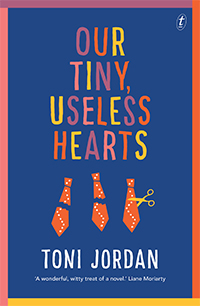Classic Farce Hides the Pain
 Our Tiny, Useless Hearts
Our Tiny, Useless Hearts
Toni Jordan
ISBN: 9781925355451
$29.99
269 pp
Text Publishing 2016
Other reviewers seem to have focused on the farce aspects of this new novel by Toni Jordan and a classic bedroom farce it is. As a farce, the story is a well-paced romp with frequent and surprising twists and turns.
Many reviewers have labelled the book ‘romantic’. Whether it really is romantic depends very much on what that word means to you. There is little about the story I find romantic. The three couples and one interloper do not fit my idea of romance. They are self-obsessed, self-absorbed, cynical, jaded, tired and unhappy – none of this lends itself to romance in my world.
Although I generally don’t enjoy farces, this book held me from beginning to end, because of the underlying current I felt running through it: the effect of the adults’ dysfunctionality on the lives of their children. One of the couples, Caroline and Henry, have four- and seven-year-old daughters who witness much of the infantile behaviour of the seven adults. The girls absorb, react and speak their minds – at least Mercedes, the older one, speaks; the younger Paris has chosen to be all but mute. Toni Jordan has observed young children well and they are believable throughout. If there is a lesson in this story, it is the children who teach it.
Toni Jordan shows the same perception and storytelling skills as she has done in her other three, award-winning novels: Addition (2010), Fall Girl (2011) and Nine Days (2013). She has a capacity to live in the heads and hearts of her characters and to tell the story from inside those characters. Each of her four novels is very different from the others and the characters are as well. There is no sameness about Toni’s writing.
While the behaviour of the adults in Our Tiny, Useless Hearts is, largely, reprehensible, it is also understandable to some extent in light of what we learn about their childhoods, much of it damaging to developing psyches. Yes, they have reasons for their dysfunction but they fail to take their responsibilities as adults seriously. As I have often observed in families with damaged adults, the children can demonstrate preternatural maturity in dealing with the difficult situations they have been born or thrust into. The children may even end up feeling responsibility for parenting the parents and they frequently feel it falls on them to find solutions to problems they are not equipped to deal with and that are, really, not theirs to solve.
It would be a great shame if this excellent novel is bypassed by potential readers because of its ‘comedy’ label – they would miss a thoughtful exploration of human behaviour. I found most of the adult behaviour excruciating, but that is precisely what gives this novel depth. It is so much more than a farcical romp.
© 2016 Daan Spijer
[to receive an email each time a new review is posted, email me: <daan [dot] spijer [at] gmail [dot] com>]
 CLICK HERE to download a formatted PDF of the above post
CLICK HERE to download a formatted PDF of the above post
 See more of Daan Spijer’s writing and his photos at Seventh House Communications
See more of Daan Spijer’s writing and his photos at Seventh House Communications